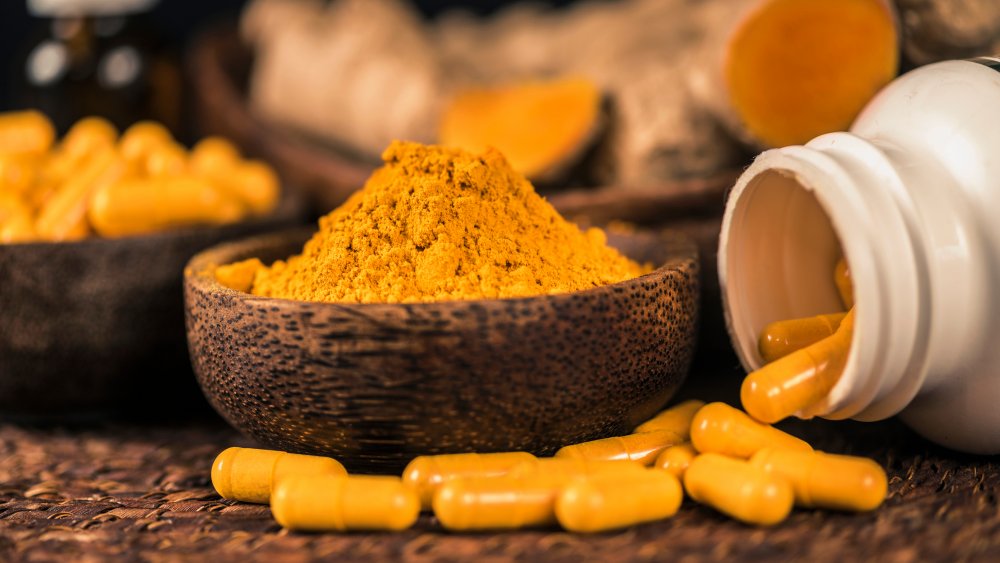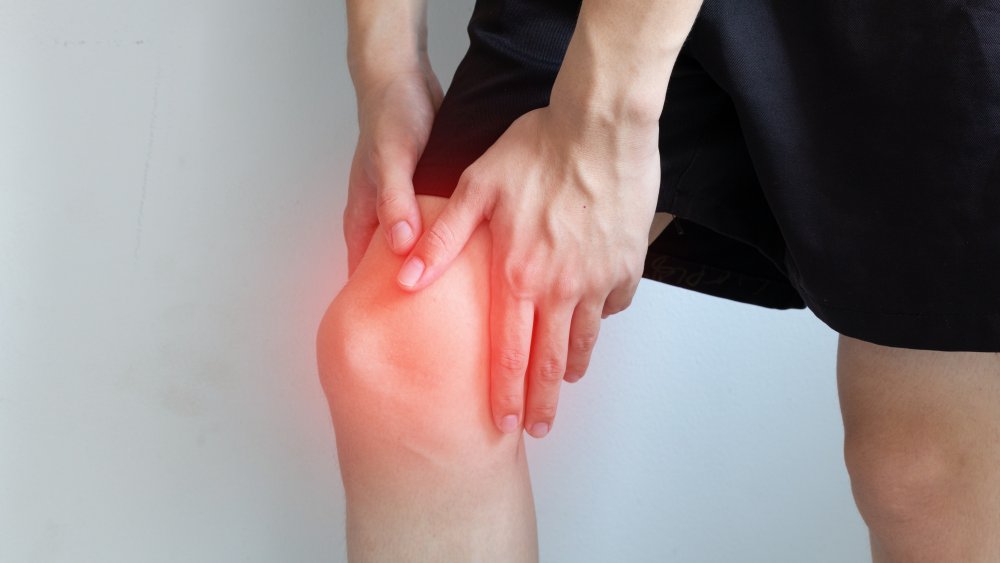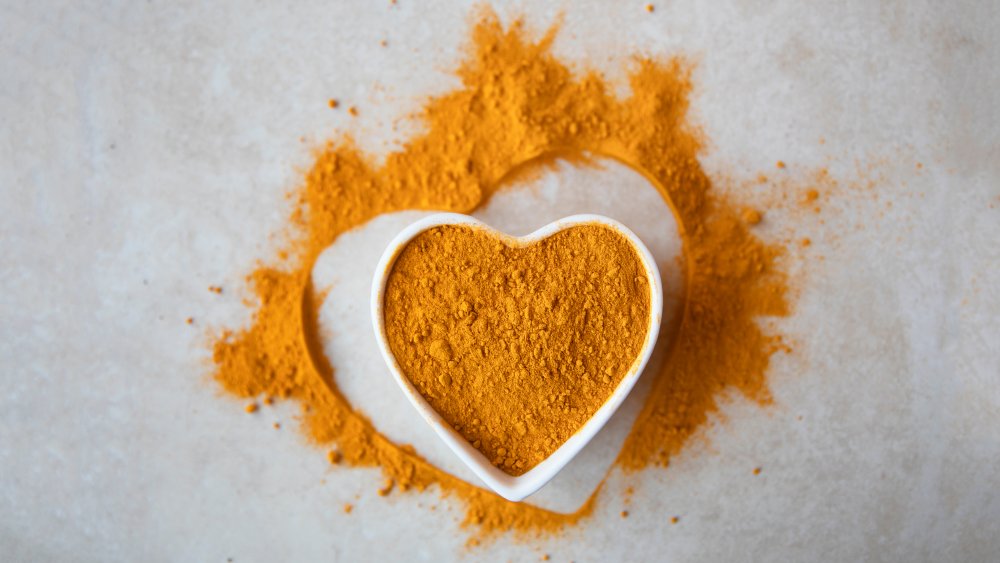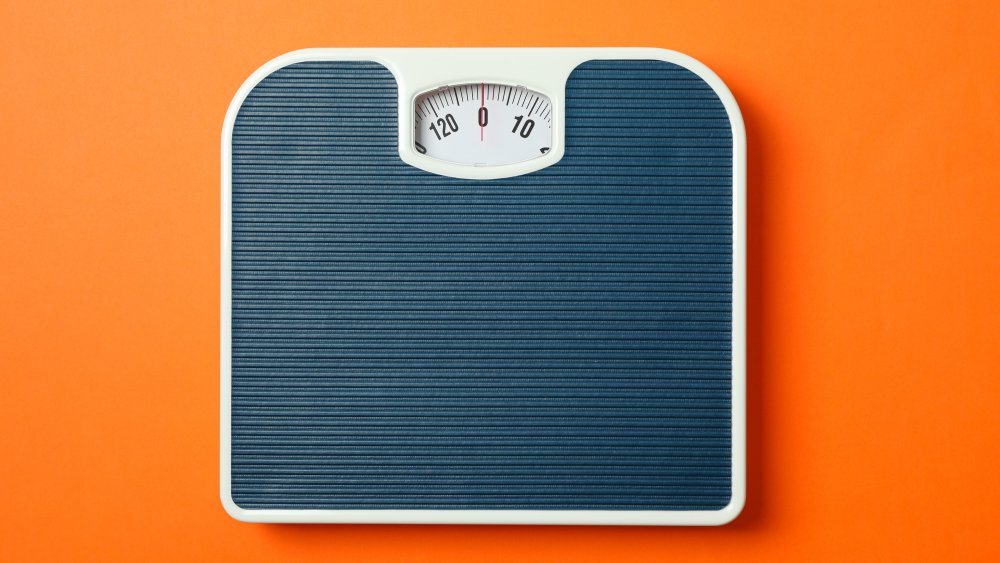When You Take Turmeric Every Day, This Is What Happens
Although turmeric has a long and storied history as a spice in Chinese and Middle Eastern dishes, the bitter, earthy spice is also a renowned staple in traditional Eastern medicines, where it has been used for thousands of years "to 'tone' blood, relieve digestive ailments, control breathing problems, improve rheumatism, diminish pain, and fight fatigue," according to Everyday Health.
Today, turmeric is widely available as a spice and a supplement. You can use turmeric to make everything from a skincare mask to a delicious smoothie. And as physicians have known for thousands of years, no matter how you get it, turmeric can have quite the impact on your health. Interestingly, though, your body can have a hard time absorbing turmeric on its own. However, if you pair it with black pepper, your body's ability to process the spice increases by more than 2,000 percent, according to Healthline.
Want to know more about this incredible plant? Read on to learn a few of the ways turmeric can dramatically improve the quality of your life.
Taking turmeric every day can help curb inflammation
Turmeric's reputation as one of the cornerstones of alternative medicine is based on centuries of use. "Turmeric is auspicious and one of the most important herbs," Anupama Kizhakkeveettil, a specialist in Ayurvedic medicine told The New York Times. "We use it for so many different conditions," the doctor continue, "it's a time-tested herb."
While many people talk about turmeric itself as a potent disease fighter, it's actually a chemical within the spice called curcumin that gives the spice its power. In addition to providing turmeric with its vibrant, bright orange color, curcumin appears to have a number of health properties. One of the biggest is its ability to fight inflammation.
The process is complicated, but curcumin basically acts as a blocking agent, preventing a molecule called NF-k8 from entering the nucleus or brain of individual cells in your body and turning on genes that trigger inflammation (via Healthline). This is important since low-level, chronic inflammation from things like infections, injuries, autoimmune disorders, or toxins has been linked to nearly every chronic disease.
Consuming turmeric every day may just lower your cancer risk
While turmeric appears to fight disease in numerous ways, its biggest potential use may be in the war against cancer. There's abundant research showing lower rates of the disease in countries where turmeric is consumed most frequently in meals, according to Cancer Research UK. To find out why, scientists have studied the spice extensively.
In a report published in the journal Nutrients, researchers found over 12,000 different published medical studies on curcumin and its effects within the body. The review's authors found that 37 percent of all the research conducted on the spice focused on turmeric as a cancer treatment. And the overwhelming results of all that research were positive, with researchers concluding that the spice does appear to be "an effective anticancer drug" and may inhibit the "development of several cancers."
"Some lab studies have found [turmeric and curcumin] might work against lung, breast, prostate, and colon cancers," WebMD revealed. "Others suggest that curcumin might help chemotherapy work better." When researchers compared the effects of curcumin plus chemotherapy versus chemotherapy alone, they found that curcumin made the chemo more effective.
A daily dose of turmeric could help you better deal with depression
An estimated 18 million Americans have depression. What many such ones may not know, however, is that inflammation appears to play a role. One 2016 study found that "interactions between inflammation and the brain appear to drive the development of depression and may contribute to non-responsiveness to current antidepressant therapies." And as a proven fighter of inflammation, that means that turmeric — or more specifically curcumin — can be a powerful weapon against depression.
In a 2013 study of the spice's effectiveness in this role, researchers gave 60 depressed patients daily doses of the antidepressant fluoxetine, a 1,000 mg supplemental dose of curcumin, or a combination of both medications. They found that people responded positively to both treatments at nearly the same rate — and the combination of both pills was slightly more effective at treating depression than either pill on its own. In another study of 108 men with depression conducted in China, a 1,000 mg dose of curcumin taken daily for six months was more effective than a placebo for improving effects of depression.
However, this doesn't mean you should replace your antidepressant with turmeric. "The herb should only be used under your doctor's supervision to complement your existing treatment plan," Healthline advised.
Taking turmeric every day could have benefits for your brain
Alzheimer's disease is a progressive degenerative disorder that affects the performance of the 100 billion nerve cells in our brains, negatively impacting memory, thinking, and behavior, according to the Alzheimer's Association. While there is no cure, there are a number of different substances that appear to slow or help prevent its development — and turmeric is among that select group.
While most of the studies showing that the herb may help to prevent the development of Alzheimer's have been performed on animals, a few important human trials do exist. One of the most exciting for researchers was published in the American Journal of Geriatric Psychiatry (via ScienceDirect). In it, physicians found that older men and women without dementia who took a twice daily 90 mg curcumin supplement for 18 months were able to significantly improve both their memory and overall cognitive function.
"Curcumin has been tested in older people and found to improve attention and working memory," Ashok K. Shetty, a specialist in regenerative medicine at Texas A&M University told Everyday Health. "It appears to be safe, well-tolerated, and seems to have several [promising] beneficial effects."
Taking turmeric regularly could help ease symptoms of arthritis
Although you may think of arthritis as one disease, it's actually the term physicians use to lump together pain in the joints or joint diseases. There are actually over 100 different kinds of arthritis, all of which cause pain, swelling, stiffness, and loss of mobility within the joints (via the Arthritis Foundation). While these conditions can have many different triggers and causes, one thing that the majority of them have in common is that they cause painful inflammation within the body. And as you're likely starting to learn by now, turmeric is a powerful weapon against such inflammation.
In a report published in the Journal of Medicinal Foods, researchers decided to test the pain-fighting effectiveness of turmeric versus non-steroidal anti-inflammatory drugs like diclofenac and ibuprofen. The scientists also examined other studies looking at arthritis pain and the relief different treatment options brought. Their conclusion? Turmeric supplements can reduce arthritis symptoms just as effectively as many over-the-counter and prescription pain relievers.
The study showed that "taking turmeric extract three times daily was comparable to taking a 1,200-milligram dose of ibuprofen," said Mayo Clinic nutritionist Katherine Zeratsky. Just limit doses, she warned, since excessive intake may cause gastrointestinal upset for some people.
Taking turmeric every day may protect your heart
Heart disease is the number one killer on the planet, taking 17.9 million lives each year, according to the World Health Organization. But numerous studies show that consuming turmeric through food, in tea, or as a supplement may help you to reduce your heart disease risk. The beneficial effects of the spice show up in a number of ways.
A Thai study published in the International Journal of Cardiology found the spice may help to prevent atrial and ventricular arrhythmias (aka irregular heartbeats). Turmeric is also a powerful blood thinner, similar to aspirin, physician Ben Brown explained in an article for Ornish Living. When your blood is thin, platelets are less likely to clump together, reducing your risk of blood clots and strokes.
Turmeric has even been shown to lower risk of death in people who already have heart disease. In a study published in The American Journal of Cardiology, researchers looked at 121 men and women who were undergoing bypass surgery (via Reuters). Half of the individuals were given daily curcumin supplements while the other half got a placebo. The result: Turmeric lowered the patients' risk of a post-bypass heart attack by a full 65 percent!
Taking turmeric regularly could lower your chances of developing diabetes
The curcumin in turmeric is a potent weapon against diabetes. One 2013 study of rats found that curcumin can favorably counteract many of the factors that can bring about type 2 diabetes, including insulin resistance, high blood sugar levels, and drops in the pancreas' production of insulin.
To test that claim, researchers in Thailand analyzed 240 people who were prediabetic — meaning they were at risk for developing diabetes. The researchers had the volunteers take supplemental doses of curcumin or a placebo for nine months. No other changes were made to either group's lifestyles. At the end of the trial, the results of which were published in the journal Diabetes Care, 16 percent of the placebo group developed diabetes while none of the individuals taking curcumin developed the disease.
In addition to lowering diabetes risk, curcumin also appeared to improve the function of the cells in the pancreas responsible for making insulin. The more insulin your body makes, and the more sensitive it remains to the hormone, the less likely you ultimately are to becoming diabetic.
If you take turmeric every day, you might be less sore following workouts
"Whenever you strength-train or do cardiovascular exercise, you're creating mini-traumas in your muscles," exercise physiologist Joanne Donoghue explained to Shape. When the body repairs those fibers, muscles grow. But until that damage is repaired, you also hurt. However, turmeric appears to be able to help relieve that pain.
As part of a study published in The FASEB Journal, researchers gave 59 individuals either curcumin or a placebo following a workout. After eight weeks, the individuals taking the 200 mg dose of curcumin reported significantly lower levels of soreness after intense exercise. Additionally, an animal study published in the journal Nutrients, revealed that mice who were given curcumin had greater levels of endurance and increased grip strength compared to mice who were not given the chemical. You're no mouse, of course, but these benefits could carry over to humans as well. Score!
You could have fewer symptoms of PMS thanks to an everyday dose of turmeric
Premenstrual syndrome (PMS) is, well, a beast. It can leave you grumpy, anxious, sore, and feeling too tired to take on the world. But a regular serving of turmeric in your food or as a supplement could help you keep those PMS symptoms at bay.
In a clinical trial published in Complementary Therapies in Medicine, researchers gave 35 women a curcumin supplement daily for one week leading up to menstruation and three days during, recording the severity of their PMS symptoms throughout. Another group of women recieved a placebo and had their symptoms recorded as well. They repeated the study for three successive months. The researchers found that by helping to reduce inflammation, curcumin greatly decreased all the test subjects PMS symptoms with no serious side-effects.
"You can definitely embrace turmeric in cooking, but it would be hard to reach that level of curcumin (200 mg) without supplementation," physician Kanchan Koya told MindBodyGreen. Instead, Dr. Koya recommends taking a turmeric supplement "twice daily (every 12 hours) for seven days prior to the commencement of menstruation and three days into menstruation."
A regular helping of turmeric could help to balance out your cholesterol levels
Turmeric may just be a helpful tool for balancing your cholesterol, whether you're trying to lower your body's LDL ("bad") cholesterol or ramp up HDL ("good") cholesterol. Older research published in the Indian Journal of Physiology and Pharmacology found that taking a 500 mg dose of curcumin daily led to a 33 percent increase in HDL cholesterol and a decrease in total serum cholesterol by nearly 12 percent.
Later studies have confirmed similar findings. Curcumin keeps cholesterol in check by preventing the liver from producing it in the first place as well as increasing the amount of LDL cholesterol that the liver clears from the body and even preventing the intestines from absorbing it (via University Health News). Turmeric may also help keep levels of triglycerides — another fatty compound found in the blood similar to cholesterol — under control.
Taking turmeric every day could relieve symptoms of irritable bowel syndrome
For those who don't know, irritable bowel syndrome (IBS) is a common long-term ailment that impacts the large intestine. According to the Mayo Clinic, symptoms include cramping, abdominal pain, bloating, gas, diarrhea and constipation.
To look at turmeric's impact on IBS symptoms, researchers from The University of Reading in the U.K. gave 207 volunteers with symptoms of IBS two given either one or two tablets of turmeric for eight weeks. At the end of the trial, the subjects were then surveyed about the severity of IBS symptoms they'd experienced over the length of the trial. The results revealed that IBS prevalence had decreased significantly in both groups, dropping by more than 50 percent after treatment began.
Healthline cited several different animal studies that may explain the spice's beneficial impact on IBS. In one study, the spice appeared to lessen contractions within the intestine while in a different study, turmeric appeared to improve the performance of neurotransmitters in the brain, improving the transmission of signals between the brain and the intestines (a process that could also lessen the impact of IBS).
You might have fewer headaches if you take turmeric every day
"Based on its anti-inflammatory properties it can be deduced that turmeric could be beneficial in preventing migraines," registered dietitian nutritionist Vanessa Rissetto told the U.K.'s Daily Mail. However, she cautioned that more studies are needed. That said, some research has backed up this hypothesis.
A study published in Nutritional Neuroscience tracked volunteers who regularly had migraines to see if a combination of curcumin and the naturally occurring antioxidant coenzyme Q10 (which helps to keep cells energized) experienced fewer headache bouts. It did — successfully reducing the number of days headaches struck as well as their overall length and severity.
As part of a study published in Immunogenetics, researchers reported similar findings with the pairing of curcumin and omega-3 fatty acids. In this case, individuals who took the combination supplement experienced fewer migraines than individuals who took nothing or who took either supplement on its own. While researchers typically pair curcumin with other proven headache fighters like Q10 or Omega 3s, the supplement is just as powerful on its own, advised the experts at the Chicago Headache Clinic. They recommended taking 500 mg or curcumin every three hours as needed. Of course, it's wise to speak with your doctor before taking any supplements.
Taking turmeric every day can help clear up acne
Turmeric face masks are beloved on social media. The skin-clearing home remedy typically include turmeric, of course, plus ingredients such as aloe vera, hone, and yogurt. The ingredients are mixed together to form a paste, which is then smeared on the face and left to dry for 20 minutes. The good news? They appear to work!
"Turmeric has been used for centuries in Eastern medicine for its healing properties," said Yale dermatologist Mona Gohara in an interview with Cosmopolitan. Its dual powers as an antioxidant and anti-inflammatory have been shown to help brighten dark spots on the skin, fade scars, and may even help to slow the formation of fine lines and skin damage caused by aging, she said.
The spice is also a potent tool in the fight against zits and pimples. "Acne is caused by follicular occlusion, microbial overgrowth, sebum production, or inflammation," dermatologist Purvisha Patel, founder of Visha Skincare, told Well+Good. Turmeric fights all four. Patel said simply applying turmeric to the skin was enough to help in mild to moderate cases of acne. For more severe or cystic acne, she recommended a daily 400 to 600 mg oral supplement.
Taking turmeric every day might help you lose weight
The golden spice known as turmeric has a reputation for helping to promote weight loss — and it's well earned. The benefit comes from turmeric's ability to reduce levels of inflammation within the body. "When you have less inflammation in your cells, it frees your metabolism, allowing it to burn hotter," ayurvedic specailist Suhas Kshirsagar told Woman's World.
In a study published in the European Review for Medical and Pharmacological Sciences, Italian researchers gave 44 people with metabolic syndrome (a cluster of conditions including high blood pressure, high blood sugar, high cholesterol, and obesity) a daily 800 mg curcumin supplement. In 30 days, the subjects' lost an average of 5 percent of their body weight.
While further research is ongoing, simply using more turmeric as a spice to flavor chicken, rice, curries, or other dishes you cook at home could also help you to drop a few pounds. "When food is more flavorful, people tend to be satisfied with less of it," nutritionist Alissa Rumsey, a spokesperson for the Academy of Nutrition and Dietetics, told Women's Health.















